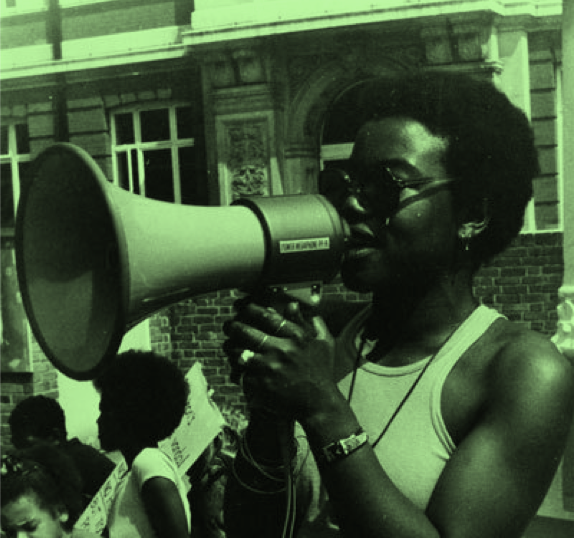✏️ Rachael Thacker
Determined and fearless, Olive Morris was a young force to be reckoned with as she helped to empower her peers.
Born in St Catharines, Jamaica, by the age of nine Olive moved to South London in 1961. Like most people, there isn’t one clear event which seems to have politicised her. Yet the continual struggle with racism she faced during her childhood is likely to have catalyzed her growth and involvement in active politics. Taking her stand at a young age to say enough is enough.
Police Brutality
In November 1969, Nigerian Diplomat Clement Gomwalk, was forcefully dragged out of his car by police officers. They didn’t suspect that he could lawfully own his Mercedes. Not believing his innocent cries they continued to beat him.
Olive, despite only being 17, stepped into the growing crowd of commotion and outcry. She was handcuffed by officers and was assaulted. At the station officers described how the bruises were meant for her and they matched her skin tone.
In addition to this, at the station the abuse continued. Threatened with rape she was forced to take her clothes off, “They all made me take off my jumper and my bra in front of them to show I was a girl. A male cop holding his billy club said, ‘Now prove you’re a real women’” (https://www.tandfonline.com/doi/full/10.1080/00064246.2016.1147937?scroll=top&needAccess=true)
This terrifying experience would be enough to silence anyone, not Olive Morris.
Black Panther Movement
Soon after her encounter with the police, Olive joined the youth branch of the British Black Panther Movement. Inspired by their American counterparts and following the right-wing politician Enoch Powell’s 1968 “Rivers of Blood” speech, The British Panthers wanted to remake Black British identity, with those who had the ideas and power to make a change.
As a result of her involvement with the Black Panthers, Olive learnt about how to effectively mobilize people, getting them to listen, and inspire them. All skills that she continued to demonstrate as she expanded the fight against discrimination.
Olive Morris helped to set up the Brixton Black Women’s Group and also the Organisation of Women of Asian and African Descent. These groups gave women the means to start combatting the systemic racism which they faced everyday. Through rallying, writing and creating a united front.
Squatters’ Campaign
Many black people were (and still do), living in unacceptable housing conditions, within the questionable housing regulations. There were thousands of people waiting on housing lists, yet still some properties were unoccupied.
Olive thought it was unacceptable that people might be struggling to keep a roof over their head, and these spaces weren’t being utilised. In fact, occupying abandoned property was not a crime; and if they occupied the space for a certain length of time, they could claim rights to that property.
Some of the spaces they squatted in became headquarters for the Brixton Black Women’s Group. For example, an empty flat above a laundrette was turned into a bookshop. This space supported black people learning about their rights and history, but also creating a sense of community.
SUS Law
SUS law was an abbreviation for suspected person, where anybody could be stopped and searched if an officer merely thought they had an intention to commit a crime. This lead to major racial profiling, enforcing the sterotype that black people were criminals.
Following her graduation from Manchester University in 1978, Olive returned to Brixton, starting a career at the Community Law Centre campaigning to scrap the ‘sus’ laws.
Although the riots that happened in St Pauls, Bristol, Toxteth, Liverpool, Handsworth, Birmingham, Chapeltown, Leeds and Brixton, were all fueled by the overarching issue of racism. The abolishment of the ‘sus’ law was a more tangible change they were demanding.
Despite the sus law being repealed in August 1981, there has since been legislation that act as another sus law. We continue to see the disproportionate stop and searching of black individuals. With black people being “9.7 times more likely to be stopped and searched by an officer than a white person.” (https://www.theguardian.com/law/2019/oct/24/stop-and-search-up-by-almost-a-third-in-england-and-wales)
If you are interested in knowing more about your rights while being stopped and searched. Here is a link to the governments outline; https://www.gov.uk/police-powers-to-stop-and-search-your-rights
Olive’s legacy
Tragically, Olive passed away due to cancer at 27 years old. Despite her unsuspected and sudden death she lived a life with integrity and left an inspiring legacy.
Olive’s activism spread across a variety of crucial social issues, yet at her core, was always the progression and empowering of young black women. In 2011, the Olive Morris Award was launched to acknowledge young women who are engaged in grassroots politics and support them with a bursary to allow them to continue with their activities.
If Olive was still us today, she would only be 68. I hope this puts into perspective how recently these significant political movements happened. I have no doubt that Olive Morris would be marching alongside us at our current Black Lives Matter marches.
Thanks for reading our article! We know young people’s opinions matter and really appreciate everyone who reads us.
Give us a follow on Instagram, Twitter and Facebook to stay up to date with what young people think.

